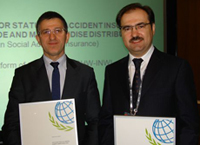International Events
The Social Fund of the Russian Federation develops interstate and international cooperation to the limit of its jurisdiction in the field of state pensions and pension and social insurance, and participates in the drafting and implementation of respective agreements with other states.
International cooperation of the SFR aims at creating a positive image of the country as a welfare state, whose primary objective is the creation of conditions for worthy life and free development of a human being, the provision of state support to families, mothers, fathers and children, disabled and elderly citizens, the development of a system of social services, the assignment of state pensions and benefits alongside other social protection guarantees, and the guaranteed provision of social benefits to every citizen on old age, disability, loss of breadwinner, raising of children and other grounds defined by the law.
The Fund participates in the implementation of social security agreements to the limit of its jurisdiction and interacts with partner organizations from other countries, by exchanging practices and guidelines, holding joint events, and fulfilling international programs in Russia and abroad.
International activity bolsters bilateral contacts with international social security organizations and promotes professional development of Fund managers and specialists.
PFR is an organizer of international conferences and seminars attended by representatives of foreign states in the territory of the Russian Federation:
Fund employees represent Russia at similar events held abroad.
PFR has established and is developing partnerships with many foreign social security and pension insurance organizations, most fruitfully, with European states, Germany and Poland in the first turn.
 |
Since the day of its establishment, PFR has been engaged in large-scale cooperation with Germany’s Deutsche Rentenversicherung Bund in main areas of the organization’s activity under the protocols signed annually. |
 |
In the past two years, the Fund has been maintaining fruitful business contacts with Poland’s Zakład Ubezpieczeń Społecznych (ZUS). An agreement was reached to sign a cooperation memorandum in 2011. |
 |
In 2011 the Russian Pension Fund and the Swedish Pensions Agency signed a cooperation memorandum. Bilateral contracts highlighted the following issues: |
PFR maintains bilateral partner relations with social security agencies from the UK, Israel, Spain, Finland, Central and East European countries, Latin American and Asia Pacific states and sporadically interacts with all leading countries of the world.
Negotiations on broadening the range of bilateral cooperation with social security and pension agencies from Hungary, Finland, France and Croatia were conducted in 2015.
|
1. International Social Security Association (ISSA) |
|
 |
Since 1992, the Pension Fund of the Russian Federation has been a full member of the International Social Security Association. The PFR Board chairman is a member of the ISSA Bureau and the ISSA Nominating/Election Committee. A.V. Drozdov has been a member of the Bureau and the Committee since 2008. Membership in the Association enables PFR to participate in every major international event dedicated to social security and pension insurance, to establish and develop partnerships with social security organizations, and to use best available pension practices of leading countries of the world in its activity. |
|
2. International Association of Pension and Social Funds (IAPSF) |
|
 |
PFR is also a member of the International Association of Pension and Social Funds comprising pension and social funds of CIS and Baltic countries. Since 2001 the Association has been chaired by PFR Board First Deputy Chairman A.V. Kurtin. The Fund interacts with social and pension agencies of countries of the Community of Independent States and the Baltic republics within the IAPSF framework. |
|
3. International Organizations |
|
|
The Fund maintains bilateral contacts with the following organizations: |
|
 |
The International Labor Organization (ILO) |
 |
The Organization for Economic Cooperation and Development (OECD) |
 |
The World Bank |
 |
The International Monetary Fund (IMF) |
 |
Committees of the Council of Europe |
 |
Eurasian Economic Union (EAEU) |
| The Fund holds consultative meetings with leading specialists from international financial and national institutions involved in social security and pension insurance matters in regard to reforms of the pension system. |
|
|
4. The Baltic Conference on Social Security PFR is a member of the Baltic Conference on Social Security. The Fund organized Conference events held in St. Petersburg in 1999 and in Svetlogorsk in 2010, and PFR delegations annually participate in Conference meetings. |
|
PFR is a winner of International Social Security Association Award
 The Pension Fund of the Russian Federation won the contest “Best European Practice 2010” held by the International Social Security Association (ISSA).
The Pension Fund of the Russian Federation won the contest “Best European Practice 2010” held by the International Social Security Association (ISSA).
An award in the nomination “Public Services based on Social Security Cards” (a priority sphere: information and communication technologies as a strategic management tool) was presented to PFR Board Chairman Anton Drozdov at the ISSA European Regional Security Forum* (Warsaw, Poland, March 3-5, 2010).
In their comments on the award presented to PFR, independent international jury members praised the Pension Fund’s initiative to introduce electronic social security cards to guarantee services to a majority of the population and to provide citizens’ access to their rights through efficient widely spread structural and administrative practices.

